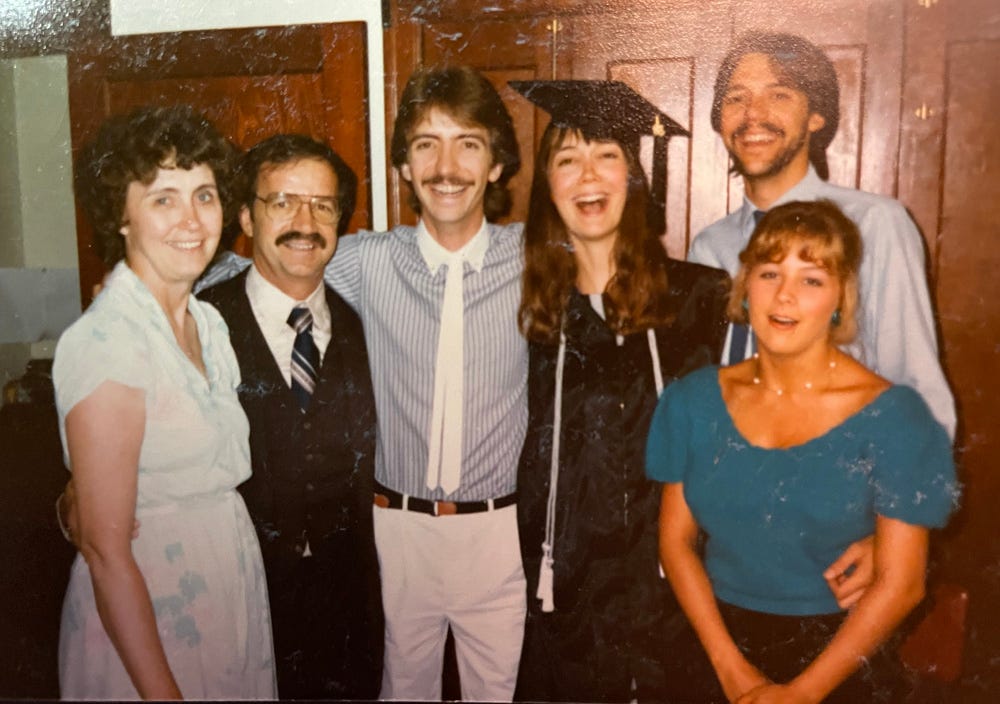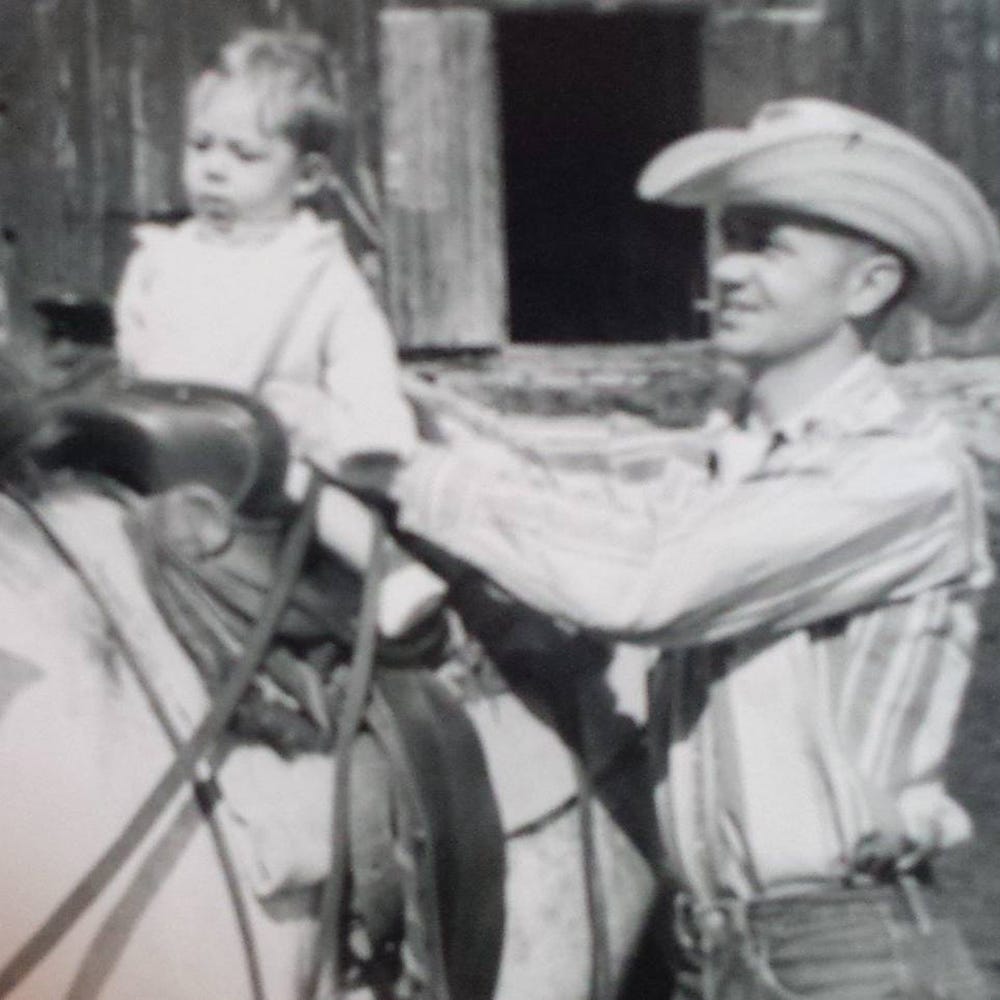Slow Epiphanies
Denial and addiction can be contagious in a family.
On December 8th, 1980, six days after my 23rd birthday, I sat depressed and alone in a tiny apartment in West Seattle. My new roommates, Steve Millen and his girlfriend Sue, were out for the evening. I was sitting on the couch that also served as my bed, watching Monday Night Football. New England Patriots kicker John Smith was about to attempt a field goal with three seconds left to beat the Miami Dolphins when Howard Cosell, in his distinctly melodramatic fashion, announced that John Lennon had been shot and killed.
I was an aspiring musician, and a young man with a rising sense of social consciousness. John Lennon was my personal hero. This news plunged me into an immediate sense of despair. It also triggered an overwhelming craving for a drink. But I was completely broke—not a dime to my name—so I scoured the apartment until I found a bottle of Kahlua tucked in one of the kitchen cupboards. I drank the whole bottle, then snuck out to the dumpster to dispose of the bottle before my roommates got home, hoping they wouldn’t notice its absence.
Eight months earlier, I had driven home to Billings, Montana to an alarming turn of events in our family. That afternoon, the moment I entered the house, I sensed something was off. My sister and brother were sitting in the dining room, looking kind of shell-shocked. I heard my mom upstairs, and when I asked my siblings where Dad was, they exchanged a look and told me I should probably talk to Mom.
My mom was just sitting on her bed, which was unusual for her. I asked her what was going on, and she answered, “You know your dad was supposed to be home from that workshop in Minneapolis for parents of kids with addiction problems?"
“Yeah.”
“'He called a few days ago and said that he’s checked himself in for treatment. He says he’s an alcoholic.”
I frowned. “Dad’s not an alcoholic.”
“That’s what I said too, but he handed the phone over to a counselor, who told me that Dad needs help. I don’t understand it.”
For the next couple of weeks, my family puzzled over what seemed like a completely spontaneous decision by my father to admit himself for treatment. The fact that we didn’t think he was an alcoholic was just one of many indications that we knew nothing about alcoholism. I remember sitting with one of my cousins—in a bar, of course—trying to figure out what prompted this bizarre decision.
“I was reading this pamphlet about alcoholism,” I told him, “And it mentioned something about people who are ‘potential’ alcoholics, and I think maybe that’s what’s going on. Maybe he’s just worried that if he keeps drinking, he might become one.”
We nodded and clinked our beer mugs, having solved the mystery.
The truth was, for years, my father had been ‘hiding’ a bottle in the garage and another under the seat of his car. It was a very badly kept secret that we never talked about. He also frequently didn’t bother to come home after work, ‘forgetting’ to call my mother when he went out with his buddies for a drink. Or ten. As the oldest child, I often found myself consoling Mom about why he wouldn’t at least let her know where he was, so she wouldn’t worry. But this was the mid-70s, when this kind of behavior was more acceptable among young fathers. The need to blow off a little steam was considered normal. Wives who complained were nags, which became one more excuse to drink.
A couple of weeks after my father’s announcement, my mother, sister and brother and I flew to Minneapolis for Family Week—five days of intense group sessions, some alone with the family and some with other patients in the treatment program. By the end of that week, not only did we realize that my father was indeed an alcoholic, but a spark had blown up into a bonfire in the back of my brain, telling me something I didn’t want to hear.
Epiphanies can come suddenly but grow slowly, and that’s exactly what happened over the course of the next several months. I knew after that trip to Minnesota that I needed help, but I was only 22 years old. I wasn’t convinced that my problem was serious. So for nine months, I made an unconscious effort to prove it to myself. I drank like a maniac. Beer had always been my drug of choice, but I suddenly found myself unable to drink enough beer to get as drunk as I wanted. For a while, I tried ducking into the closest bathroom to purge so that I had more room for what I needed.
It didn’t take long to realize this solution couldn’t continue, so I resorted to drinking the hard stuff, mostly whiskey. And that accelerated my downfall. After a hazy summer in Eugene, Oregon, where I helped one of my best friends paint a house, I made the spontaneous decision to move to Seattle. And that’s where I had my fateful meeting with Steve Millen.
I had auditioned to play piano for Steve, an aspiring country singer. Although I was born and raised in Montana, I was not a country music fan; I especially didn’t like the kind of music Mr. Millen played, which was slick and smarmy. But thanks to Urban Cowboy, country music was trending, and I needed a job. I joined Steve's band, which ended up being just the two of us. He knew I was broke, so he invited me to stay with him and his girlfriend Sue, who worked for Boeing. I had moved in only a week before that awful night when John Lennon died.
What I didn’t know was that Steve Millen had also just moved in. He and Sue had been having an affair that broke up his marriage and got him excommunicated as deacon of their church. So he decided this was the time to pursue his lifelong dream of becoming a big star. He quit his corporate job and Sue agreed to support them for a while. One of the reasons I was depressed was because there were several other red flags about Steve Millen, including the fact that he would saunter out into the living room and dry himself off after his morning shower every day.
I don’t remember whether they ever noticed the missing bottle of Kahlua. But I knew by now that I needed help. Still…not enough to do anything about it.
In the midst of all this dysfunction, Steve and I managed to get a couple of paying gigs, the last of which was a company Christmas party. One of the perks of this job was free access to the bar. I got so drunk that night that my playing was sloppy and I kept forgetting the lyrics. Steve shot several dirty looks my way.
Sue also got very drunk that night, and after we loaded our gear, I noticed her staggering down a flight of stairs, so I picked her up to carry her to the car. As we came down the stairs, Steve just happened to be coming up. I could tell from his glare that our days as a band were over. The next morning, he gave me a week to move out.
Thankfully, the man who hired us for that party was pleased enough with our performance that he gave us a hefty bonus. So I had enough money to secure a rented room on Capital Hill, and within a few days, I was living in a new place. And one Sunday evening, I slumped into my first AA meeting.

Despite the fact that I felt an immediate connection to AA meetings, and attended religiously from that first day, it would be more than two years before I took my last drink. As with most epiphanies, the climax came without as much drama as you’d expect. I stood up from the dinner table one night, just a month or two after I married a woman I met in the program, and told her I needed to get drunk.
Nothing terrible happened that evening. I didn’t get arrested. I didn’t cause a scene. I didn’t end up in the hospital or wreck my car. Instead, I tucked myself away in a sad little bar, just three blocks from where I live now, and I drank alone until my wife somehow found me and asked me to come home.
I would like to say that the reason that was my last drink was because I felt badly about how it must have impacted my wife. It must have been hard for her to watch the man she had just married turn his back on a commitment to stay sober. But I think it was much more basic than that. I think it was a simple matter of something breaking inside.
Whatever it was, it has worked for 39 years now, and I will always feel as if I owe it to my father for being the first to crack that door open. Alcoholism is a mysterious disease; the inspiration for people to stay sober is often just as hard to understand as the reasons they drank. My father never drank again after that trip to Minneapolis; he died with 33 years of sobriety. But I have met many people in my journey who exhibited far worse symptoms but were never able to stop.
Denial can be contagious in a family. When I made the decision to get help, my father was almost a year sober. He was going to meetings regularly while Mom attended Al-anon. So I couldn’t wait to tell them about this important revelation. I called and got them both on the line and said, “I’ve decided I have a problem and it’s time to do something about it, so I started going to meetings.”
There was a long pause before my father finally cleared his throat and said, “Are you sure?”
Russell Rowland is the highly acclaimed author of seven books, including Fifty-Six Counties: A Montana Journey, In Open Spaces and Cold Country. He hosts a podcast, Breakfast in Montana, about Montana books, and he also hosts Fifty-Six Counties, a radio show on Yellowstone Public Radio. He has an MA in Creative Writing from Boston University and lives in Billings.



powerful writing, Russ. thank you.